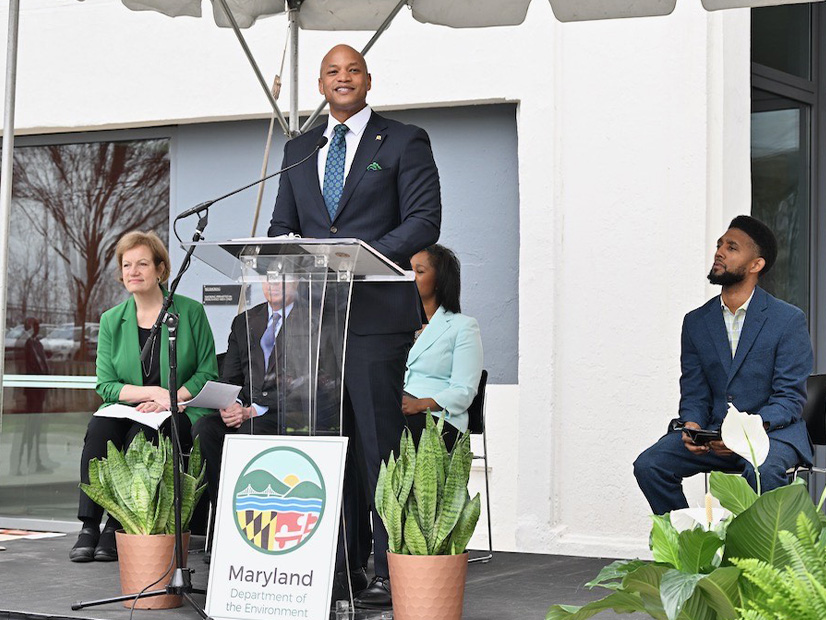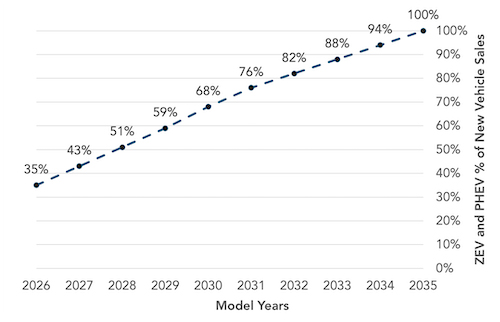
Maryland is set to fast-track adoption of California’s Advanced Clean Cars II (ACC II) rule, requiring that 100% of all new passenger cars, SUVs and pickup trucks sold in the state be zero-emission vehicles by 2035.
The Maryland Department of the Environment proposed the regulation to the Monday morning meeting of the state’s Air Quality Advisory Board, which quickly voted out a recommendation for the department to move ahead with enacting the standard, according to a press release from the Governor’s Office.
Announcing the proposed adoption later in the day in Baltimore, Gov. Wes Moore (D) said the new rule would be part of a “major transformation that is going to define this administration — and that’s how we turn Maryland from a state powered by oil and gas to a state powered by clean energy.”
With the passage of the Climate Solutions Now Act (SB 528) last year, Maryland now has nation-leading goals for greenhouse gas emission reductions: 60% below 2006 levels by 2031 and net-zero by 2045. ACC II “will be one of the state’s most important emission reduction measures,” the press release said.
As originally adopted in California last August, ACC II requires car manufacturers in a state to provide an increasing percentage of zero-emission vehicles (ZEVs) for sale each year. It defines zero-emission as including battery-electric, hydrogen fuel cell electric and plug-in hybrid vehicles.

The regulation starts with a 35% ZEV sales requirement for model year 2026, increasing to 68% in 2030 and reaching 100% in 2035. (See Calif. Adopts Rule Banning Gas-powered Car Sales in 2035.)
ACC II also includes increasingly stringent low-emission vehicle standards aimed at reducing tailpipe emissions of gasoline-powered cars and heavier passenger trucks sold in a state.
According to an analysis from the Maryland Department of the Environment, the rule would reduce the number of gas-powered cars sold in the state by 383,000 by 2030 and by 1.68 million by 2035. In addition, between 2026 and 2040, the rule would cut nitrogen oxide emissions by 6,000 tons and carbon dioxide emissions by 82 million metric tons.
The analysis also estimated that such emission reductions could cut respiratory and cardiovascular illness in the state, along with lost workdays, providing in-state health benefits of close to $40 million per year by 2040. Figures from Baltimore Gas and Electric also show that EVs are cheaper to operate than gas-powered cars, potentially saving consumers hundreds of dollars per year.
Environment Secretary Serena McIlwain called the proposed regulation “a big step toward cleaner air and a more aggressive response to the threats posed by climate change.”
‘A Proven Policy’
The announcement also drew statements of support from both industry and environmental groups.
“As a business at the forefront of mobility solutions, we know that technology and market demand are both ready to support the transition to clean vehicles,” said Ryan Dalton, head of external affairs and policy for Siemens. “Strong state standards that reflect the escalating consumer demand and set clear expectations for market growth over the coming years are key to managing the transition.”
ACC II “is the best way to attract investment and provide predictability for manufacturers, companies, workforces and consumers alike,” Dalton said.
Kim Coble, executive director of the Maryland League of Conservation Voters, praised Moore and McIlwain for “acting so immediately to advance zero-emission vehicles and reduce harmful emissions. … The Advanced Clean Cars II rule is a proven policy for reducing greenhouse gases from transportation.”
California has been able to enact its strict clean car standards under a waiver, allowed by the Clean Air Act, which allows the state to enforce emission reduction standards that exceed the federal levels set by the EPA. Once such standards are adopted in California, other states may also adopt them.
California first enacted regulations aimed at cutting emissions from cars in the state in the 1990s, and the third iteration of the rules, passed in 2012 have since been adopted by 17 states. As of January, New York, Oregon, Vermont and Washington have adopted ACC II, and Massachusetts, Delaware and Colorado are considering it.

